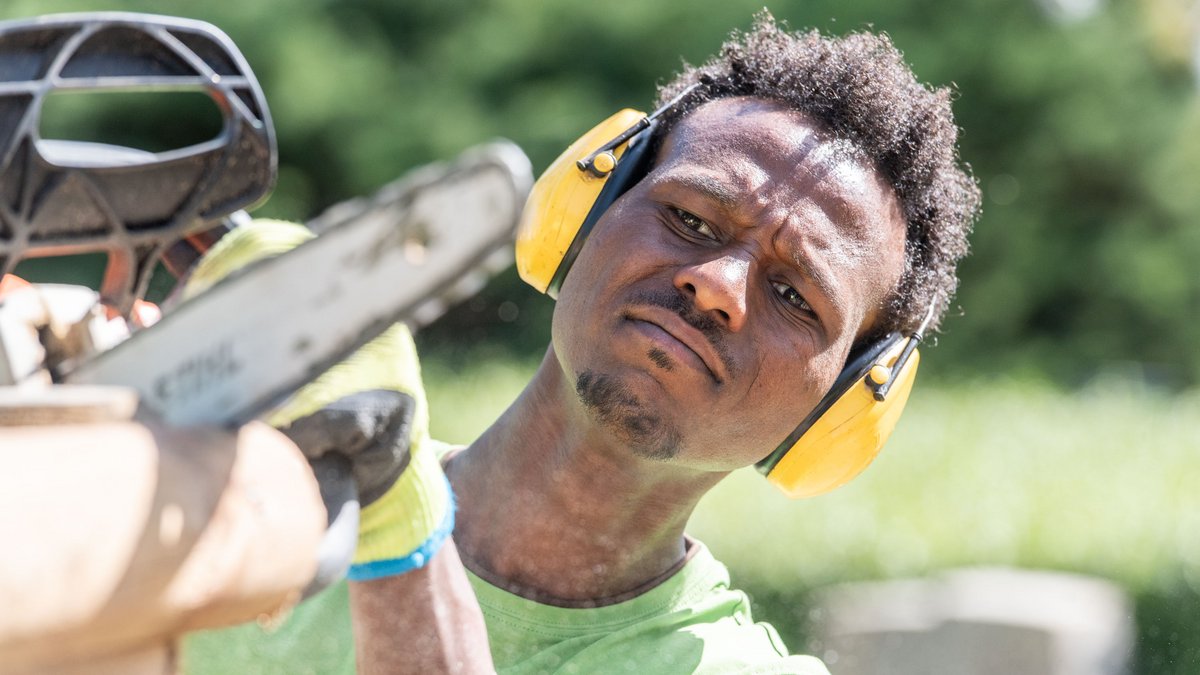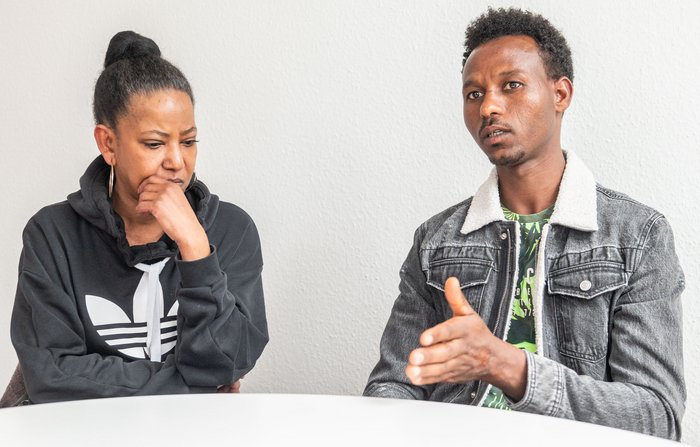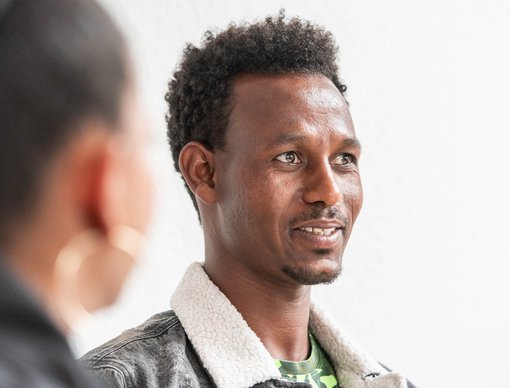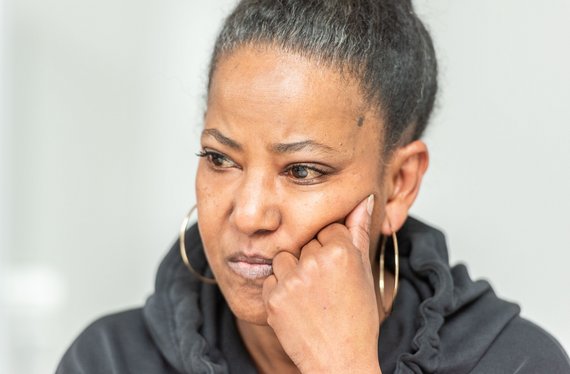At “seminars” and festivals held by those loyal to the regime, they can be recognized by the number 52 (the five stands for the E, the two for the B) on their T-shirts. Ghidey calls the fact that the PFDJ is allowed to act so openly in Germany “a mockery of democracy.”
Trauma is limitless
By Franziska Mayr
Source: Kontext
Date:April 24, 2024
Forced into lifelong national service, persecuted, imprisoned, tortured: like many Eritreans, Semere Negasi left his country and went through hell. If he and other opposition members in the diaspora meet the dictator’s followers, the situation quickly escalates. This is an attempt to explain their anger.

She doesn’t see why the conflict of such a distant country is being fought here. “This has nothing to do with Germany,” the judge at the Bad-Cannstatt district court concluded the trial against Merhawi B., an Eritrean citizen, at the end of February. For reasons of space and security, negotiations are taking place in Stuttgart Stammheim. The young man is accused of throwing the concrete base of a construction fence in the direction of the police during riots at the Stuttgart Roman fort in September 2023.
Aster Ghidey sits as a spectator in the courtroom when the verdict comes down. Three years and nine months imprisonment. She can hardly swallow. A few weeks later, at the kitchen table in the context editorial team, her big, dark eyes are tear-shot again. They are tears of anger, of fear. “What kind of signal does this verdict send?”
She was also there at the Roman fort in September and demonstrated against a so-called seminar organized by the umbrella organization of Eritrean clubs. Such events are seen as the long arm of the dictatorship. Donations collected there flow directly into the coffers of President Isayas Afewerki, who has ruled the country in East Africa autocratically since independence from Ethiopia in 1993: without a constitution, the rule of law and basic civil rights.

Ghidey, an activist in her mid-50s , has been campaigning since 2016 against Eritrean associations in Germany, which are allowed to hold propaganda festivals here due to freedom of assembly. “Young refugees are retraumatized by this, they are extremely emotional,” she says. Semere Negasi sits next to her at the table. The 33-year-old came to Germany from Eritrea ten years ago and had to flee because leaving the country without an exit visa is not allowed. At the borders, Eritrean soldiers are under orders to shoot. Negasi appears composed and describes his journey to Germany soberly.
Military service often lasts a lifetime
At the age of 17 he made his first attempt to escape. He wants to get away from his home village, away from Eritrea, which is not called the “North Korea of Africa” for nothing. He wants to escape military service, which he would have been obliged to do at the age of 18 at the latest and which was actually only supposed to last a year and a half. But this “national service,” which is mandatory for all Eritreans, is usually arbitrarily extended for an indefinite period of time. According to Amnesty International, it is equivalent to forced labor and is considered the main reason for young Eritreans to flee. His father, says Negasi, joined the military in 1994 – and is still there today.
In February 2008, Semere Negasi wanted to flee to Ethiopia with two friends. But at the border they are arrested by Eritrean soldiers. With their arms and legs tied behind their backs, they lie on their stomachs in the open air all night long: the “helicopter” is one of the most common and worst torture methods in Eritrea. Then Negasi’s odyssey from one prison to the next begins. He is usually in one place for about two weeks; due to extreme overcrowding, the prisoners are transported further – to the next overcrowded prison.
He summarizes the conditions there in a table, almost matter-of-factly: “No light, almost no water, only food once a day. We weren’t allowed to shower or talk, otherwise we were beaten straight away.” He sleeps on the floor of the cell, if you’re lucky you have a cardboard box as a base. There are hard, dry rolls to eat that Negasi can barely chew. And sometimes a small glass of lentil soup with two or three lentils. The rest is water.
The Eritrean writer Yirgalem Fisseha Mebrahtu, who was herself imprisoned in her home country, describes it like this in one of her poems: “My cell as big as me. / The floor my bed. / … Hell is in here, the door is the mouth of the beast . / … If the devil wanted to take me and carry me away, / I wouldn’t ask where.”
After several weeks, Negasi is taken to the Adi Abeto army prison in Asmara, the Eritrean capital. He presses the middle three fingers of his right hand together. “So,” he says, “there were 800 people lying next to each other.” Twice a day – early in the morning and in the evening – everyone had to go out to go to the toilet at a collection point. There was a single large bucket in the cell for day and night. The temperature was between 30 and 40 degrees, the smell was unbearable.
Cultural associations loyal to the regime as tax collectors
The temperature in the Stammheim courthouse is a moderate 22 degrees. This is the second investigation into the riots in the Roman fort. The defendant Grmay G., also an opponent of the regime, who wanted to demonstrate against the Eritrean “seminar”, is said to have thrown at least one stone at police officers. The defendant’s defense attorney herself comes from Eritrea and, after reading out the charges, she says a few words to the judge and the prosecutor: The “seminar” belongs to the dictatorial government. In this way, attempts are being made to infiltrate the Eritrean diaspora “under the guise of civility”. She speaks of trauma, of the dictatorship that is “orchestrated by the Eritrean embassies abroad, including in Berlin and Frankfurt.”
Only those who pay the so-called “diaspora tax” to the Eritrean government – two percent of their annual income, regardless of whether from work or social benefits – can get passports, birth certificates or other papers from the consulate. According to estimates, around a third of the Eritrean state budget comes from money from Eritreans abroad. Because the collection of the diaspora tax by the consulates in Germany is prohibited, representatives of the so-called Mahbere-Koms, associations loyal to the regime in the guise of apolitical cultural associations, act as informal tax collectors. “Many people support the regime because it benefits them,” says Aster Ghidey. Many of Isayas Afewerki’s supporters in the diaspora fled the country before or during the War of Independence and today celebrate him as a national hero who fought for Eritrean independence. “The dictator just has to say: Jump! They don’t ask why, but how high.”
After 15 days in Adi Abeto, Negasi is loaded onto a truck with other prisoners. Destination: Wi’a – the infamous military camp and prison . They are on the road for half a day; anyone who falls off the truck is shot. They have to walk the last part. Without shoes at 45 degrees over sand, stones and thorns. “The feet were burned like a fire,” says Negasi. 700 people are housed in a container-like cell. Surrounded by five to six meter high walls with barbed wire fences, Negasi and some fellow prisoners plan their escape.
Every morning at ten o’clock a handful of prisoners have to fetch water from a dirty pool outside the wall. On a Wednesday, Negasi is chosen for this – and six others who would dare to try to escape. At the pool they count quietly: “One, two, three” – and start running: four to the left, two to the middle, Negasi, as he tells it, alone to the right. “They were shooting at us from all sides.” He is the only one who makes it, the others are caught.
Starving, dehydrated and without shoes, Negasi’s three-day march through the heat begins. In the evening he reaches a Muslim village. “I was almost dead.” But a family takes him in and gives him yoghurt with sugar to drink. As well as a bed for the night and shoes for the rest of his journey. When he reaches home on a Friday evening, his mother and sister are crying. He can hardly move for two weeks. The skin on the soles of his feet is open and raw.
“The snake is better than the soldier in Eritrea”
The judge in Stammheim takes a sip from her water bottle. Many hours have now passed. Video excerpts from the riots were shown. Only police officers are invited as witnesses. 39 police officers were injured in the incident. In the end, the second defendant is also convicted. Three years and three months. Aster Ghidey is particularly annoyed when Baden-Württemberg’s Interior Minister Thomas Strobl (CDU) demands that more harsh measures be taken. “How about instead you sit down at a table with these young people and ask: Why are you so emotional?”

Years earlier in Eritrea and back home with his family, Negasi has to hide from the police. He usually spends the night in the mountains, 60 kilometers away. “With all the wild animals in Eritrea?” asks Ghidey, stunned. “The snake is better than the soldier in Eritrea,” replies Negasi. In November 2008 he attempted to escape the country again. He wants to go to Libya, but can’t make it across the Eritrean border.
Again he goes from one prison to the next. And again he ends up in Wi’a, the former cistern from the Italian colony times. This time he is placed in an underground cell called “Under” . He’s been there for seven months. Then follow two months of military course. There he learns how to disassemble and reassemble a Kalashnikov. And how to shoot.
As a trained soldier, he comes to a soldiers’ village near the Sudanese border. Because he can read and write well, unlike many older military men, he becomes something of an accountant: he records who leaves Eritrea and returns and writes reports. In order to see his family again after a year, he takes a vacation and only returns to work after several months because of the strategic location in Sudan. Because he was away for so long without permission, he was put back in prison – from June to December 2011. At the end of the year he was forced to take what he calls an Eritrean “politics course”. “Brainwashing and propaganda,” says Negasi. “Homeland ideology,” interjects Aster Ghidey. “This keeps people in the diaspora.”

In addition to the many organizations and associations in Eritrean countries that are under the control of the PFDJ, the ruling party, the youth organization YPFDJ (Young People’s Front for Democracy and Justice) is the most active. The Frankfurt group Eri-Blood recruits many of its followers from there, who use violence against opposition members in the diaspora. At “seminars” and festivals held by those loyal to the regime, they can be recognized by the number 52 (the five stands for the E, the two for the B) on their T-shirts. Ghidey calls the fact that the PFDJ is allowed to act so openly in Germany “a mockery of democracy.”
Sometimes there is nothing to eat for three days
The “Politics Course” is a new stimulus for Negasi: On January 7, 2012, he fled across the Sudanese border with two men. They don’t get far. In Kassala, he and his two fellow refugees become commodities for human traffickers, as is common practice on this escape route. A soldier sells them to members of the Rashaida tribe. They are held in chains in a village and because they cannot pay $10,000 to buy their freedom, they are sold on to Egypt.

Then begins the part of his escape for which Negasi can hardly find words. Some atrocities are too great for words. His empty gaze is directed into the room, his lips move and start to speak. But no sound comes out. Ghidey puts his hand on his shoulder. “Don’t worry. You’re safe now,” she whispers.
The Bedouins are in charge on Egypt’s Sinai Peninsula . He’s been there for nine months. Bound hands and feet, chained together with six people. The food is sparse, sometimes there is nothing for three days, and soon Negasi is just skin and bones, he says.
Sinai is hell, a torture chamber. Negasi and his fellow prisoners are subjected to beatings day and night. Their torturers conduct electricity through the damp chains. They pour melted plastic over their bare backs. Negasi says he will see ten people die during his time there. Most of the time the life is beaten out of them with metal rods. A man lies half-dead on his back in a cell for two weeks. He is beaten until he dies. One of the guards takes the jacket off the corpse; it sticks to the blood from the open wound and tears the flesh from the back. The body remains in the cell for three days with the warning: “If any of you don’t pay money, the same thing will happen to you.” “You could see right down to the bones,” says Negasi. The man had a wife and three children in Eritrea. “There were also children in the cell.” Negasi swallows. A mother was beaten to death in front of her three-year-old child. The child himself was beaten when he cried.
You can suppress a lot of things and even forget some things. Negasi shows the scars on the surface of his hand. A few of many that cover his entire body. He will carry it as a memory for the rest of his life.
$27,000 for a human life
Ten years later in Stammheim: “I couldn’t understand the sheer hatred that is so deeply rooted,” says a police chief who was invited as a witness in one of the Eritrea trials. “The abysmal hatred on their faces.” Many witnesses describe “this hatred in the eyes” of those who took part in the riots. Hatred is not understood. “I felt like I was at war,” said a 22-year-old police chief, who burst into tears as he described the events in court in September. Colleagues collapsed and cried. He speaks of “fear of death.”
“I was sure I wouldn’t survive this,” says Negasi at the kitchen table in the context editorial team. His family collects the $3,300 demanded by the Bedouins, but instead of being released, he is sold on. His new owner is asking $27,000. “I’ve never heard of anyone in Eritrea owning $27,000.” It takes months, but everyone who knows Negasi’s family sends money. And in the end they actually make it: $27,000. “I was lucky,” he says, because he is actually released after paying the ransom.
Shortly before the border with Israel, Negasi and other ransomed people are thrown out of the pickup. He crawls to the border post on all fours; he can no longer walk. Egyptian soldiers collect the exhausted men and women and take them to a police station in al-Arish. He stays there in accommodation for four months and has to go to the hospital again and again: injections, tablets, his entire upper body is wrapped in bandages. Nevertheless, Negasi considers himself lucky; at least he didn’t fall into the hands of organ traffickers, he says. Between 2010 and 2011, between 200 and 250 African refugees are said to have been kidnapped and their organs removed. Most of them died during these operations.
Finally, Negasi gets a plane ticket from Cairo to Ethiopia, organized by Meron Estefanos, a Swedish-Eritrean human rights activist . He arrives there in March 2013. He is registered with the UN High Commissioner for Refugees (UNCHR) and can fly out of Ethiopia. Months later he made it to Sudan and finally, after eight days and nights, crammed into a pickup truck with other refugees to Benghazi in Libya. He is there for three months until he dares to travel across the Mediterranean on a rubber dinghy. When Negasi gets out at a port in Sicily, he feels only one thing: happiness. “Lucky I made it after the whole terrible thing.” He smiles briefly; he says they were warmly welcomed in Sicily. A large hall has been prepared for the refugees; there are beds and food. “We even got fruit.” What must a spark of humanity feel like after years of hell?
After a week, Negasi travels on to Catania, then to Rome, where he lives for a month in the underground car park of a hotel where Eritreans and Somalis are allowed to live. He finally made it to the LEA in Karlsruhe via France.
According to the UNHCR, almost 38,000 people fled Eritrea in 2022, almost 4,000 of them came to Germany. Around a fifth of all Eritreans live abroad. (fra)
A regime change and the democratization of Eritrea, says Aster Ghidey, are only possible “if everyone in the diaspora pulls together.” And that’s what she wants “for young people: a free and independent Eritrea, where you can think and say what you feel. Without fear.”
Semere Negasi has now completed a German course and now works as a gardener in Ludwigsburg. He often wakes up at night and is plagued by nightmares. Trauma knows no national borders. They come to Germany with the people. And if they are repeatedly shaken up, as in Stuttgart, then they will not disappear any time soon. And that has a lot to do with Germany.
